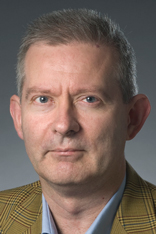Decision regarding the internal organisation of the Faculty of Arts
The faculty will continue to be organised in the same three large departments, with sections being the organisational points of focus.

The faculty management team has now made a decision following the review of the faculty’s departmental organisation that has been carried out in recent months.
“It’s actually a paradox that we’re keeping three departments. After all, the size of these departments was one of the most widely criticised problems revealed in the analysis. And yet our conclusion is that we want to keep the three departments unchanged. Actually, I think this reflects a pragmatic attitude. And it proves that we have given our subject environments a good deal of freedom, allowing the departments to make their own decisions about their internal structure,” explains Johnny Laursen, the acting dean of the faculty.
The process of establishing departmental sections will continue as planned, and Laursen underlines that this is entirely in line with the current development experienced by the university as a whole:
“The senior management team’s decision in October to decentralise decision-making powers was like coals to Newcastle for the Faculty of Arts because that’s exactly the direction we were heading in already. The existence of these sections ensures that links between the management and subjects and staff remain strong, as well as ensuring that the subjects are represented in the departmental management teams.”
Participation in research programmes will be voluntary
The decisions are aimed at achieving a greater degree of decentralisation and more flexibility, allowing plenty of freedom to find solutions to specific local problems. This applies to the way both degree programmes and research programmes are organised. The departments will be given greater freedom to decide such issues themselves.
One of the main changes is that researchers at the faculty will no longer have to be affiliated with a specific research programme. Laursen reports that this has given rise to a good deal of discussion:
“There’s been massive support for the principle of voluntary affiliation. But there has also been some concern that this might have a negative impact on the research programmes that are working well, the risk being that we might throw the baby out with the bathwater. So we’re going to let the departments make decentralised decisions about the way they organise their own research. Even so, the principle of voluntary affiliation will apply, and it takes effect immediately.”
The current research programmes will continue throughout the planned period and will be evaluated in mid-2015.
Big variation in organisation of degree programmes
Degree programmes will also be handled differently from one department to the next. A working group at each department will be asked to propose a new way of organising the department’s degree programmes.
“This is probably the area where there’s going to be greatest variation. The subjects and degree programmes at our three departments vary enormously. For instance, there’s a great deal of integration between the degree programmes at DAC, so the department should consider how many boards of studies it actually needs and whether it can adapt the degree programme committees to reflect local needs to a larger extent,” says Laursen.
The three departments have until 1 April 2015 to consider the best way to organise their research and degree programmes, and Laursen underlines the importance of preserving the option of cross-disciplinary collaboration in terms of both research and education.
Adjustment of PhD activities
The faculty’s graduate school will continue to form the framework of the PhD programmes, but staff responsibility for PhD students will be transferred to the heads of section. And the sections and departments will nominate a PhD programme director and members of the PhD programme’s standing assessment committee.
“We hope that this will strengthen the links between our PhD programme and our subject environments, thereby encouraging a sense of ownership of the programme. The PhD students also want to have closer ties to their sections, so we believe we have found the right solution,” explains Laursen.
In future the PhD programme directors should support the heads of section (for instance when holding staff development dialogues for PhD students) by informing them of the current status regarding the progress of the PhD student concerned.
Closer ties between CUDiM and the Department of Education?
The faculty management team will examine the potential for closer ties between relevant subject environments at the Department of Education and the Centre for Teaching Development and Digital Media (CUDiM). In the consultation responses both CUDiM and (to some extent) the Department of Education were somewhat reticent with regard to the idea of an organisational merger, but they are both interested in at least examining this option. Laursen explains the background for the new inquiry as follows:
“The Department of Education has a range of research activities and potentials that might well benefit from collaboration with CUDiM – in the field of upper-secondary education, for instance. And CUDiM needs closer links with the subject environments and access to a board of studies. I also think that some of our research collaborations could be exploited more effectively – the environments involved are sometimes too far apart within the organisation.”
Any organisational changes arising as a result of this inquiry will not be implemented until 2016 at the earliest. And there is a proviso: any changes in the composition of the department are subject to the approval of the AU board.
New names
The faculty management team believes that new, more meaningful departmental names may be a good idea. The task of looking into this will involve local processes, which must be concluded by 1 April 2015.
“We will allow the departments to decide whether their names truly reflect the subject areas that they cover. I’ve got no illusions: this is not going to be easy. But we’re launching the idea and want to know what our staff think about it. There might be some ideas out there that haven’t occurred to us yet,” says Laursen.
The faculty management team also wants to change the current English terms ‘section’ and ‘department’ into ‘department’ and ‘school’ respectively. The corresponding Danish terms (‘afdeling’ and ‘institut’) will not be changed. For instance, the Section for Anthropology will be known as the Department of Anthropology in future.
“This is our response to a huge demand from staff. They have a wide range of international partners, but they feel that their special subject identity has been lost. The change will also match common practice in international contexts, where the term ‘department’ is generally used for units which we currently refer to as ‘sections’,” says Laursen.
However, the decision regarding these English titles is subject to the approval of the senior management team.
In line with the decisions of 22 October
Based on the consultation responses that have been received and a number of joint meetings, the faculty management team has added an extra item to the final decision. This is all about the balance between strengthening decentralised decision-making powers while maintaining management responsibility for topics that concern the entire faculty.
“Lots of people have said that the balance between decentralised decisions and shared areas of responsibility needs to correspond to the decision of the senior management team announced on 22 October. And that this should be stated more clearly in our decisions. It was easy to comply with this wish, because it matches our feelings exactly,” says Laursen, thanking all the people involved at the faculty for what has been a constructive dialogue and process.
“This document is a genuine team effort. The document that was sent for consultation was version number 17. And this is the fifth version of the decision that has been produced. The people who work at the Faculty of Arts are writers and linguists by nature, so of course it’s important that our ideas are expressed in exactly the right way. But what we need to do now is convert theory into practice,” concludes Laursen.
The faculty’s follow-up on the review will be discussed by the senior management team on 13 January 2015.
Background
- Read the full text regarding the faculty management team’s decisions(available in English soon after the Christmas holiday in PDF format) (
- Read the background material (consultation responses etc.) on the homepage for the Arts process (unfortunately, this material is only available in Danish).

